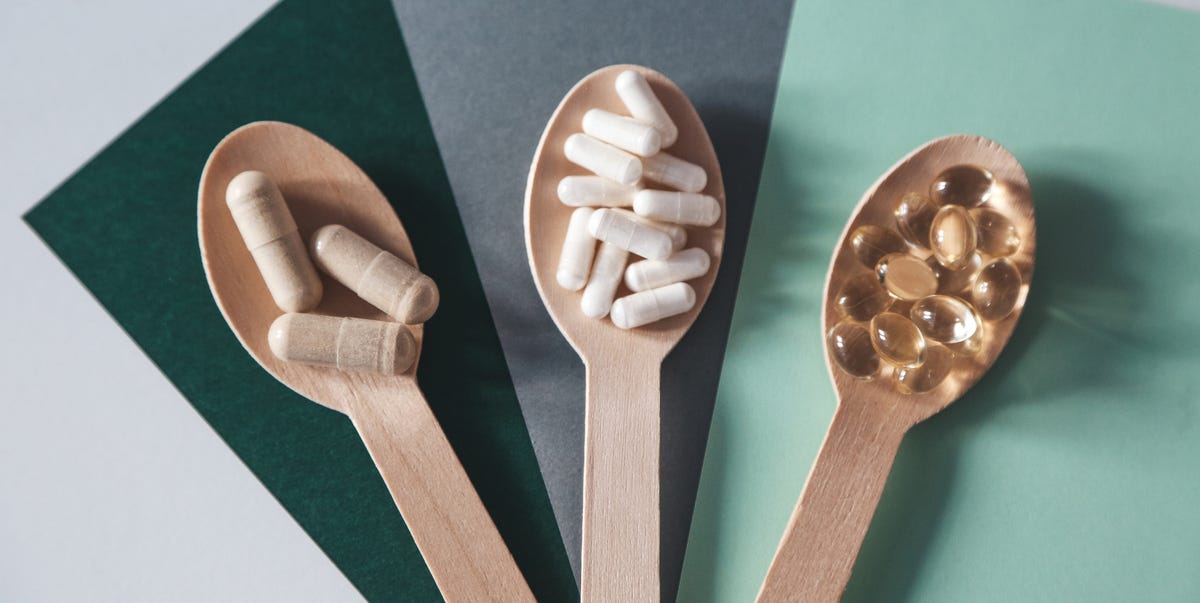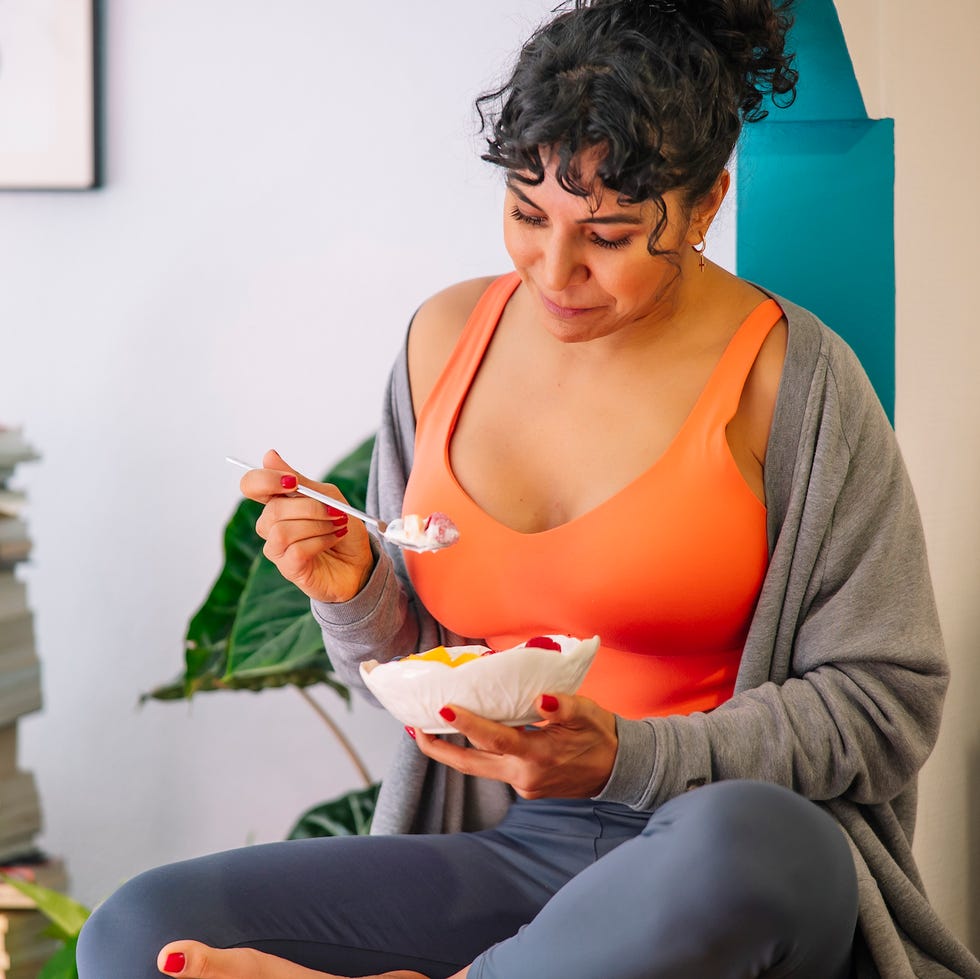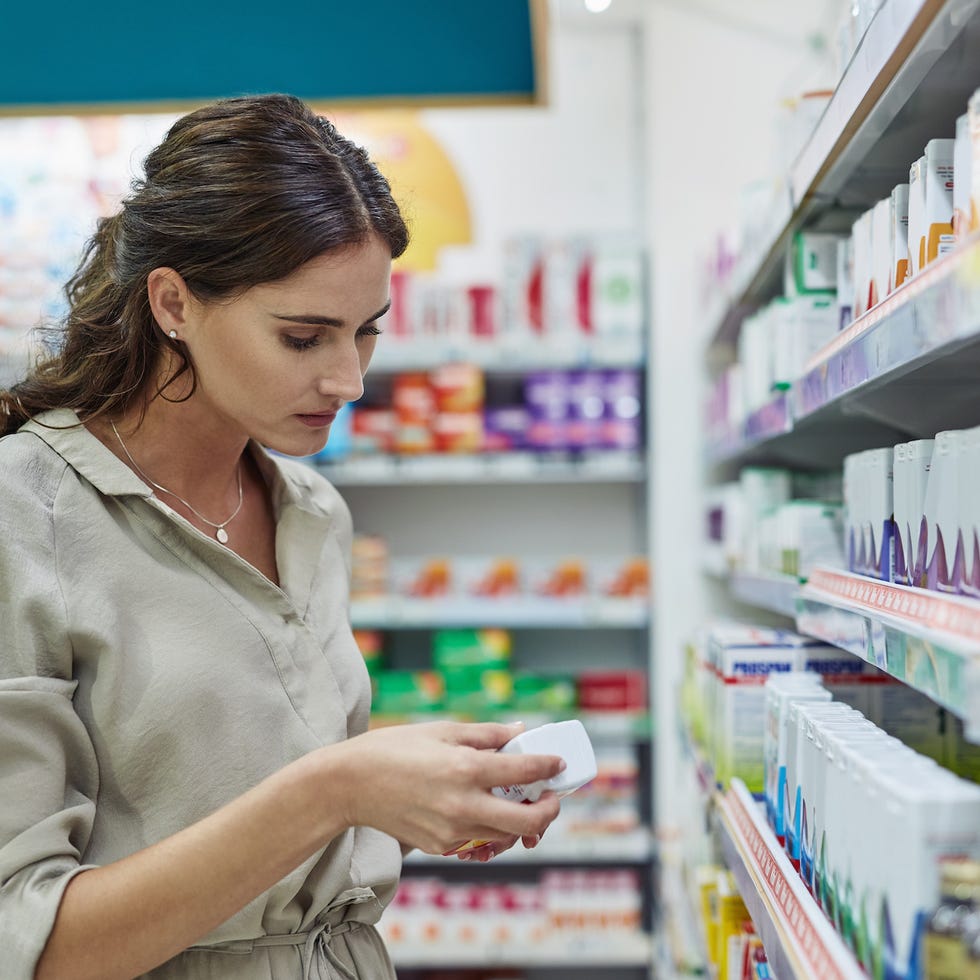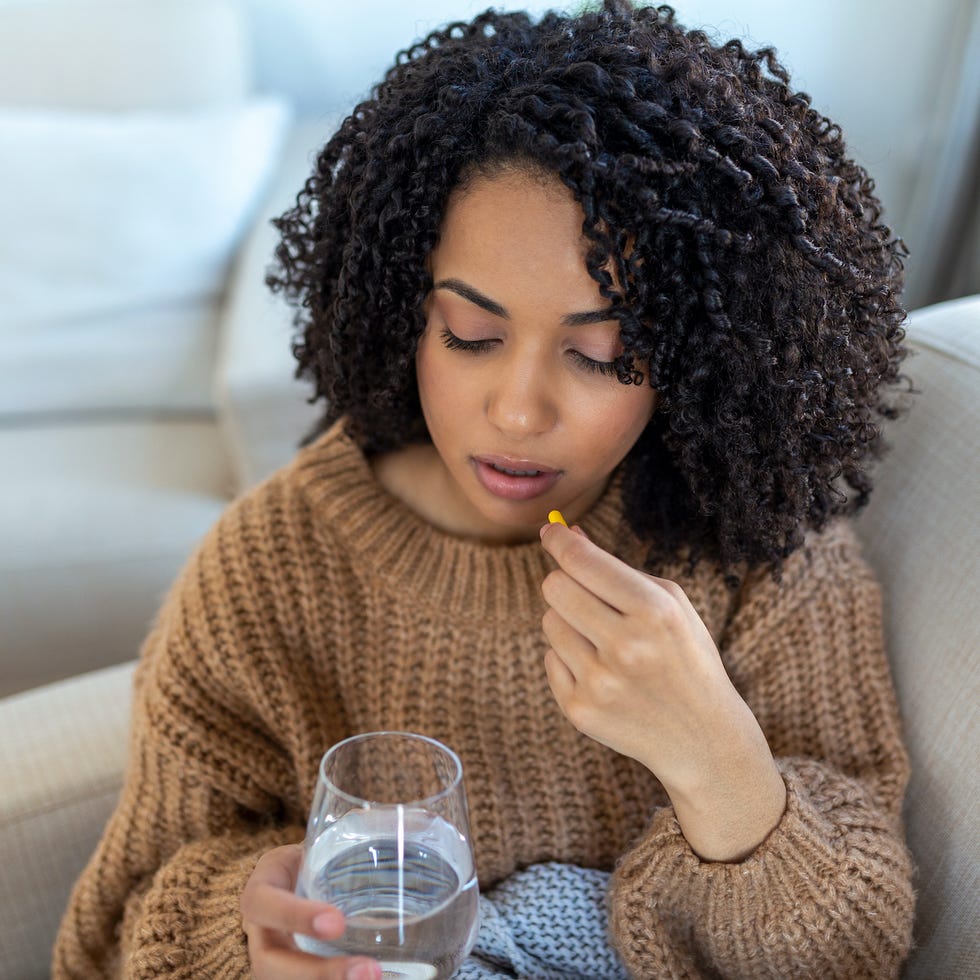Probiotics – many of us have heard about them, but how many of us actually know anything about them?
While we bet you’ve seen more Yakult adverts than you can count, the reality is that a lot of us are pretty clueless when it comes to probiotics, including what they are and how taking them regularly can benefit our health.
With that in mind, we set out to dig deep into the world of probiotics to answer your burning bacteria questions and find the best probiotics for women, according to experts. So, here’s everything you need to know about the best probiotics for women, plus how to shop for probiotics and the best ones to buy…
Kseniya Ovchinnikova//Getty Images
What are probiotics?What actually are probiotics?
“Probiotics are live microorganisms that act as proxies (substitutes) for the beneficial bacteria in our gut and help to support microbiome balance and thus health, when consumed in adequate amounts,” explains Adrienne Benjamin, gut health nutritionist at ProVen Biotics.
“Our gastrointestinal tract contains trillions of bacteria, known as our gut microbiome, which starts to form at birth and is fully established by around three years of age,” she adds. “The microbiome structure then remains relatively consistent throughout our lives, but everyday factors, such as stress, illness, and medications, can disrupt this balance and the diversity of strains.”
Why might someone start taking probiotics?
“People often turn to probiotics to help support and restore balance in their gut bacteria, especially after antibiotics, illness, or periods of stress or travel,” Benjamin tells us.
“Probiotics can help rebalance the microbiome, potentially reducing bloating, diarrhoea, and other digestive issues,” adds intimate health and women’s health expert, Dr Shirin Lakhani. “But their benefits go beyond the gut — emerging evidence suggests they can play a role in supporting the immune system, reducing inflammation, improving skin conditions like acne or eczema, and even enhancing mood and mental wellbeing.”
What can probiotics help with?
“Probiotics can help with a wide range of health concerns — both digestive and beyond,” Dr Lakhani explains. “Most people know them for easing gut-related symptoms like bloating, gas, constipation, and diarrhoea, particularly after antibiotic use or during digestive disorders like IBS.”
“They can also support immune function, reduce inflammation, and improve how we respond to infections,” she continues. “The key is understanding that not all probiotics do the same thing – different strains have different roles, so targeted use is essential.”
To that end, Benjamin adds that “recent research has identified links between the gut and other organs and systems in the body – for example, the gut-brain axis, the gut-lung axis, and the gut-skin axis – and has shown how supporting gut microbiome balance and diversity with probiotics can support conditions related to these organs and systems, such as mood, skin issues and respiratory conditions.”
Carrastock//Getty Images
Can you find probiotics naturally in food and drinks?
“Probiotics occur naturally in fermented foods like live yoghurt, kimchi, and sauerkraut, and drinks like kefir and kombucha,” says Benjamin. “Including these in our daily food and drink intake can help to support the microbiome, although the types and amounts of bacteria in these products are generally not defined and can vary.”
What are the benefits of probiotics for women?
“For women specifically, probiotics can help maintain a healthy vaginal microbiome by keeping pH levels balanced and preventing the overgrowth of harmful bacteria,” says Dr Lakhani. “This can reduce the incidence of common issues like thrush, bacterial vaginosis, and urinary tract infections.”
The expert goes on: “There’s also emerging research suggesting probiotics may support hormonal balance, skin health — especially in conditions like acne or rosacea — and even help with symptoms related to menopause or PMS. But it’s important to note that the benefits are strain-specific, so choosing the right product for your needs is key.”
Adding to that, Benjamin explains that probiotics can support women throughout the stages of our lives. “As well as supporting digestion, our gut microbiome has a central role in immunity, mood, skin health, and metabolism, and is vital in supporting hormone balance, all of which impact the many stages of a woman’s life and the shifts she experiences from menstruation to pregnancy to menopause,” the expert says.
“When a girl reaches puberty, the gut microbiome has a number of specific roles in regulating hormone production and certain species of gut bacteria influence oestrogen and other hormones and can impact the menstrual cycle,” Benjamin explains, adding: “Microbiome imbalance can contribute to inflammation and it is important to maintain a healthy gut during child-bearing years. During pregnancy and breastfeeding, bacteria and prebiotic oligosaccharides pass from a mum to her baby via the placenta and breastmilk.”
She goes on, “Many menopause-related issues are closely linked to the microbiome and gut health, including energy production, mood, weight, and hormonal balance, and research is also now linking specific symptoms, such as vaginal atrophy, itching, and dryness.”
Best probiotics for women
“The best probiotics for women often include Lactobacillus strains, particularly Lactobacillus rhamnosus and Lactobacillus acidophilus, as well as Bifidobacterium strains, like Bifidobacterium breve and Bifidobacterium lactis,” Dr Lakhani tells us. “These strains are beneficial for vaginal and urinary tract health, as well as gut health in general.”
Shop the best probiotics for women Open Gallery
Open GalleryHow to shop for probiotics
“If you’re buying probiotics for the first time, there are a few key things to keep in mind,” notes Dr Lakhani. “First, make sure the label lists the full strain names — not just the species — because different strains do different things, and you want one that’s backed by research for your specific concern, whether it’s digestion, immunity, or vaginal health.”
“Check the CFU count (that’s the number of live bacteria); aim for at least 1 to 10 billion per serving,” she adds. “Look for products that guarantee potency up to the expiry date — not just at the time of manufacture — and check whether it needs to be stored in the fridge.”
Dr Lakhani goes on, “Ideally, choose a product with a delivery system (like a delayed-release capsule) that protects the bacteria from being destroyed by stomach acid. And finally, scan the ingredients list to avoid unnecessary fillers, sugars, or allergens. If you’re unsure, choose a probiotic specifically formulated for women’s health, or ask a healthcare professional for guidance.”
LumiNola//Getty Images
Probiotics for women FAQsDo you need to take probiotics every day for them to work?
“We [at ProVen Biotics] recommend that probiotics are taken daily for a minimum of two weeks, as it can take this time to start to see the benefits,” says Benjamin. “Ideally they would be taken for at least 6-8 weeks following a course of antibiotics or some other gut issue, and they can be taken daily long-term to support ongoing digestive and immune health.”
“Yes, probiotics are most effective when taken daily,” agrees Sarah Campus, PT, nutrition coach, and founder of LDN MUMS FITNESS. “They don’t permanently stay in your gut, as they get passed away in your stool so consistent use helps to maintain their benefits, such as supporting digestion, immune health, and gut balance. If you stop taking them, their effects may gradually wear off.”
Are probiotics safe to take regularly?
“Yes, probiotics can be taken daily and long-term, although I would again emphasise the need to look for research-backed strains with guarantees of safety and certified manufacturing processes,” Benjamin advises. “In addition, if you have any serious conditions or are under the care of a medical professional, we always recommend checking with them before taking any supplement.”
Can anyone take probiotics?
“Probiotics are suitable for most people, from newborn babies to children and older adults, although again, check the research behind the products and ensure they are suitable for the age and needs of the individual,” advises Benjamin. “If you’re managing a serious medical condition or are immunocompromised, always consult your GP first.”
stefanamer//Getty Images
Are there any side effects to watch out for when starting probiotics?
“Some people may experience bloating, gas, changes in stool consistency and regularity, and other mild symptoms such as headaches and fatigue, in the first few days as their gut adjusts — this is a temporary and positive sign that the probiotics are starting to work,” says Benjamin, with Campus agreeing: “Minor side effects like gas or bloating can occur at first but usually go away as your body gets used to [the probiotics].”
Do you need to speak to a doctor before taking them?
“It’s not necessary for most healthy individuals, but we recommend that you speak with your health provider if you are pregnant, on long-term medication, or managing a health condition,” notes Benjamin.
Is there anything you shouldn’t do while taking probiotics?
“Always take probiotics alongside food, with a cold drink, as heat will destroy the bacteria,” Benjamin points out. “If you are taking them alongside antibiotics, always take the probiotics at least two hours away from each antibiotic dose. Otherwise, probiotics are safe and easy to take and there are generally no restrictions.”
To that end, Dr Lakhani reminds us that: “Probiotics are just one piece of the puzzle when it comes to women’s health.”
“Supporting a healthy microbiome also involves a balanced diet rich in fibre, staying hydrated, managing stress, and getting enough sleep,” she says. “Probiotics can help maintain vaginal and gut health, but lifestyle factors play a big role too.”
This article is not intended to be a substitute for professional medical advice or diagnosis. Always seek the advice of your physician or other qualified health provider with any questions you may have regarding a medical condition.
Related Stories
Jade Biggs (she/her) is one of Cosmopolitan UK’s freelance writers, working across all sections including entertainment, beauty, body, and sex and relationships. She previously held the position of Features Writer, covering everything from breaking news and the latest royal gossip, to the health and fitness trends taking over your TikTok feed. Jade has a degree in journalism and has been a journalist and content editor for ten years, interviewing leading researchers, high-profile influencers, and industry experts in that time. She is a cat mom to four fur babies and is obsessed with Drag Race, bottomless brunches, and wearing clothes only suitable for Bratz dolls. Follow her on Instagram, Twitter, and LinkedIn.





